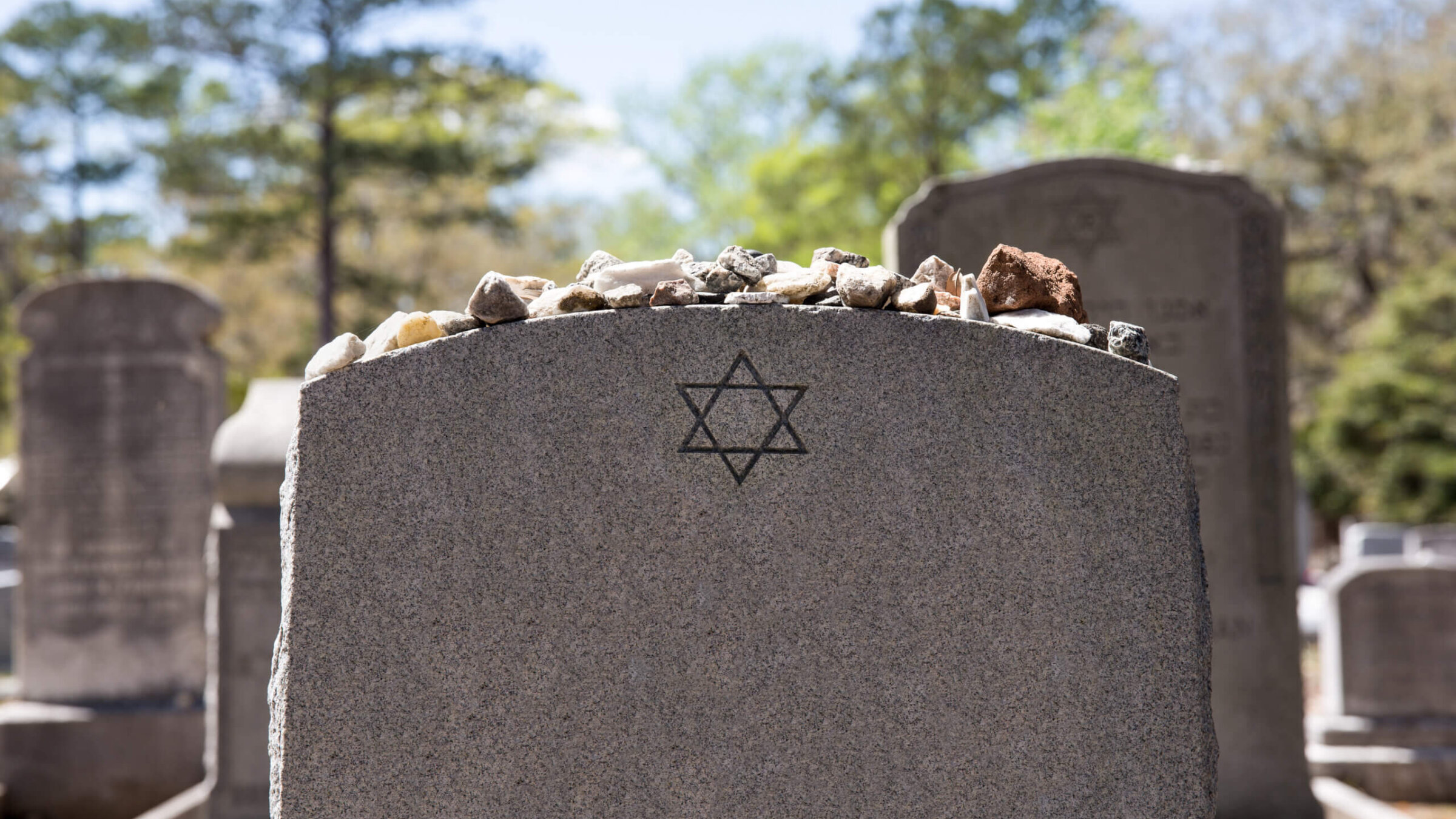Going to your first Orthodox shiva? Here’s what you need to know
No, you don’t need to bring food — but do bring a kippah

A headstone in a Jewish cemetery. Photo by iStock by Getty Images
In much of the U.S, the practice of sitting shiva has changed radically in recent decades, with many non-Orthodox Jews opting for shorter and less somber rituals.
If that’s the kind of shiva you’re used to, Orthodox shiva traditions might come as a bit of a surprise. If you have questions before your first Orthodox shiva — what should I bring? How should I dress? What should I say? — we’ve got the answers. Here’s what you need to know.
1. The mood at an Orthodox shiva tends to be somber
There are significant internal differences within Orthodox Judaism — notably between the modern Orthodox movement and Haredi Judaism.
“Orthodoxy for most things is not a monolithic thing,” said Rabbi Yonah Gross, an Orthodox rabbi in the Philadelphia area. “There are various traditions, and there are traditions within traditions.”
One common aspect between most Orthodox shivas, Gross said, is their mood. Most often held at the house of the deceased, Orthodox shiva practices center the mourners, and the memory of the deceased loved one.
When you enter the house of mourning, you may notice that the mourners are unshaved and are wearing a black ribbon tied to their clothing. The mirrors around will likely be covered, and the mourners will be seated on low stools.
“Sometimes today, you go to a shiva, and it can seem like a party,” said Rabbi Hyim Shafner of Kesher Israel, a modern Orthodox congregation in Washington D.C. “The truth is that it shouldn’t be that … Usually at an Orthodox shiva, it’s a little more somber.”
2. The food is for the mourner
You might think of shiva as a food-focused event; to many, the practice is inseparable from the image of tables piled high with bagels and babka. But Schafner stressed that in Orthodox communities, “a shiva is not a place where one comes to eat.”
“It’s for the mourner to eat,” he says. “The mourner should be certainly given the first meal after the burial.”
And while you may feel the urge to bring food to the mourners — which is often customary in non-Orthodox shivas — doing so is not a necessity. You should certainly not bring gifts or flowers.
“There’s a feeling out there that, well, I need to bring something,” said Gross. “But there’s really no obligation to feel that you need to bring anything when you go to a shiva house.”
3. Dress appropriately
There is no need to dress formally for a shiva, although after Shabbat or a holiday, some visitors may come directly from synagogue, dressed in more formal attire. It is important, however, to heed the customs of modesty followed by the specific community.
A rule of thumb, says Rabbi Gross, is to dress according to “whatever is casual dress for that community.”
In Orthodox communities that may entail long pants for men, and, for women, long skirts paired with high necklines and long sleeves. Men may also be asked to wear a kippah.
If you’re uncertain about what to wear, it’s usually worth erring on the side of modesty.
4. Women and men may be separated
At many Orthodox shivas, men and women will be separated into different rooms. That practice is very common at Haredi shivas, and implemented less frequently at modern Orthodox shivas.
Though shiva is sat from morning until night, it is common to have visiting windows — which may be publicized through the congregation of the deceased, or by the mourning family. Windows are often oriented around prayer services, as well, which take place in the morning, afternoon and evening.
“That is often surprising to people … that there is a large community,” Gross said.
5. Wait for the mourner to speak
Customarily, visitors will make their way toward mourners on the low stools. Even when you are sitting in front of the mourner, you should not say anything until they acknowledge your presence.
“One doesn’t address the mourner,” said Shafner, “until they speak to you.”
“The truth is that one’s presence alone is often more comforting than anything someone can say or can do,” says Rabbi Etan Mintz, of Baltimore’s B’nai Israel Synagogue. “Showing up is the most important thing that you can do at a shiva.”
The norm that one should wait to talk at a shiva is not consistent across Orthodox communities. Gross said that “a modern Orthodox shiva … might not have the same degree of silence that you might have in a Haredi shiva.”
Gross also suggested planning ahead what you might want to say to the mourners. The most important thing, he said, is to center the person lost — and to keep it concise.
6. What to say when you leave the shiva
When you are ready to leave the shiva house, be sure to pay your respect to the mourners by uttering the traditional blessing.
At Orthodox Ashkenazi shivas, it is common to address the mourner before leaving by saying “may the Omnipresent comfort you among the rest of the mourners of Zion and Jerusalem,” in either English or Hebrew. In Sephardic communities, the appropriate statement is, “May you be comforted by heaven.”















